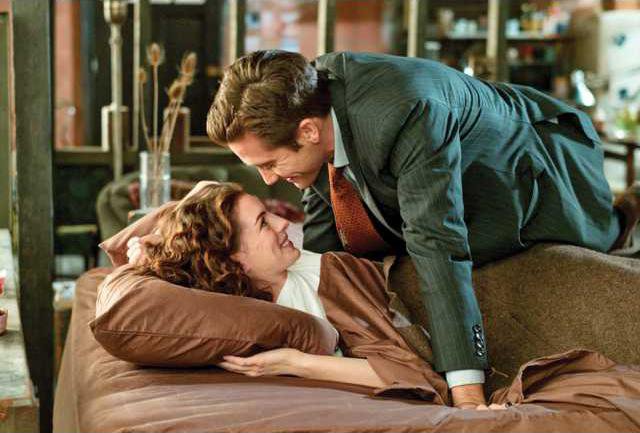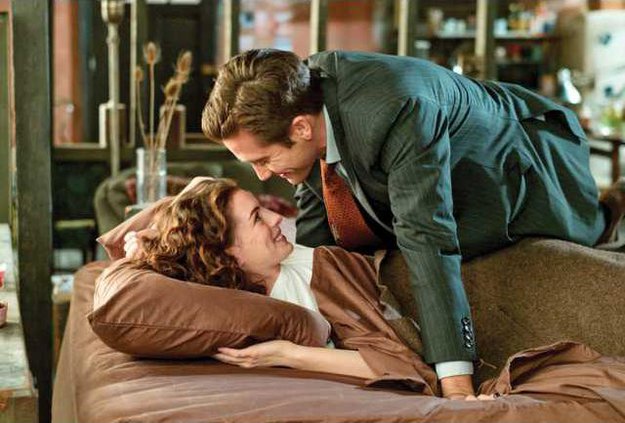Love and Other Drugs
Starring: Jake Gyllenhaal, Anne Hathaway, Hank Azaria, Oliver Platt, Josh Gad, Judy Greer, George Segal and Jill Clayburgh
Bottomline: Sexy movie with a big heart
"Love and Other Drugs" is a testament to the talent and appeal of its stars, Anne Hathaway and Jake Gyllenhaal.
Along with director Edward Zwick, the couple rescue a patchwork of a movie and make it not only watchable, but occasionally quite moving.
This romantic drama is yet another movie that suffers from too many writers. It is based on Jamie Reidy's memoir, "Hard Sell: The Evolution of a Viagra Salesman," described as a funny yet scathing exposé of the health care industry.
Three screenwriters, including Zwick, adapted the book and buried most of the exposé bits, opting instead to cull together familiar, apolitical plot devices and set pieces.
"Love and Other Drugs" begins as an upbeat comedy about mid-20s electronics salesman Jamie Randall (Gyllenhaal), whose best sales pitches end up in the bedroom. He's handsome, charming, and has seduction and sex down to an art.
When one of his conquests - his manager's girlfriend - gets him fired, Jamie becomes a pharmaceutical salesman. The movie then begins to recall "Up in the Air," another timely movie about a likeable guy working in a disgusting industry.
Jamie meets Maggie Murdock (Hathaway) while shadowing Dr. Stan Knight (Hank Azaria) as he meets with patients. The sparks immediately begin to fly - sort of. The attraction is there, but Maggie makes it clear all she wants is sex.
And oh my, do they have sex.
The middle half of this movie is a sex comedy with occasional hints of drama. Gyllenhaal and Hathaway spend a long time romping naked around Maggie's apartment, which should be fun for both male and female viewers.
It's unquestionably the sexiest movie of the year, and they perhaps even overdo it. Many of you will find this hard to believe, but the sex scenes drag on for so long that it eventually becomes tiresome to watch these two beautiful people enjoying each other.
Then just as the sex scenes begin to lose power and meaning, the movie shifts tone again.
See, Jamie and Maggie's relationship faces two problems. First, neither of them has ever been in love, nor do they want to be. While their sexual chemistry is amazing, they constantly struggle to fend off feelings of true intimacy. It's an ironic romantic complication and possibly the movie's best story idea.
The other problem, though, is that Maggie suffers from early onset Parkinson's Disease. The movie's second, but in this case bitter, irony is that this pharmaceutical salesman can do nothing to help his lover, who only functions thanks to a constant cocktail of medicines.
Eventually, Maggie's condition begins to worsen, and the movie threatens to become a Problem Picture reminiscent of a Lifetime drama, as Jamie tries to find a way to help Maggie.
Toss into this mix a bunch of comic relief from Jamie's brother Josh (Josh Gad), several scenes of silly slapstick comedy and a healthy dose of working man's lament from middle-aged pharm salesman Bruce (Oliver Platt) and "Love and Other Drugs" is one schizophrenic movie.
And yet there we are in the theatre seat, fully buying into this deeply flawed movie, only because the actors draw us in.
Twenty years ago, Tom Cruise would have played Jamie, but the star mantle has been passed. Gyllenhaal doesn't quite match Cruise's blinding charisma, but he is more likeable and relateable.
Hathaway again proves she's a force to be reckoned with, creating a character that is cynical, vulnerable, sexy and frail all at the same time.
Together, Hathway and Gyllenhaal might have the strongest chemistry among all of today's working actors. They genuinely sizzle.
Gad, Platt, Azaria, Judy Greer, George Segal, and Jill Clayburgh (in, sadly, one of her last roles) all lend spot-on supporting roles to the star turns.
All of which begs a question: who cares if the scenes don't fit together, when each one is played so well?

